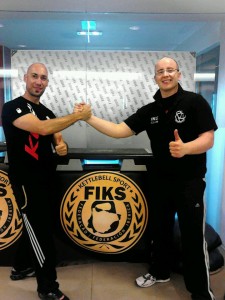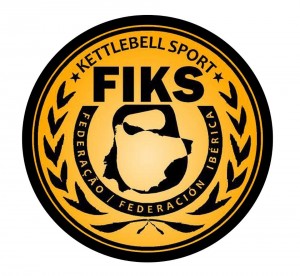This week I have been talking to Gireviks – coaches, experienced athletes and novices – about their year with Kettlebells. I was keen to see some different perspectives on the competitions and training opportunities in 2012, and hear about their personal goals for 2013. Today: Eduardo Fonseca, President of Portugal Kettlebell Club and Head Coach of FIKS (Kettlebell Sport Federation of Portugal and Spain).
Q: Can you tell us about your involvement in Girevoy Sport?
A: Well, I spent 9 months writing a book about the history of physical activity and strength training since Humans started walking. During that time I discovered amazing histories about us and amazing tools, one of them: the kettlebell! I searched more about and found this amazing tool was also a sport and decided that will be “the tool” I should learn more about and develop in Portugal. In 2009 I bought my 1st kettlebell (Iron Cast) and with time started developing my skills to GS.
Q: Do you think we are seeing a growth in interest in GS in Europe?
A: Yes, I think so! It’s not a popular or easy sport to start, I think it’s not for all and those of you who love this sport are special with a kind of personality that you all share. There are people in Europe doing great work to develop GS and kettlebells. However, there are always people wanting money from something new and might not have a GS soul. I have already competed in a few countries now, and people in GS are growing in number and in skill.
Q:Tell us about GS in Portugal and Spain please
A: Well, I am the President of Portugal Kettlebell Club and Head Coach of FIKS (Kettlebell Sport Federation of Portugal and Spain). It’s not easy to start something and continue promoting the purity of this tool, respecting all the old traditions and lifters, and not accept the temptation of using it to make money in the Fitness Industry. I try to maintain a route “out of industry” and spread the word of GS, promote good practice with the kettlebells and GS in more than 25 workshops in this 2 countries and reaching more than 200 people. In the end, about 5% to 10% go forward on it and go for GS. I can be more specific about Portugal, but looking also and teaching also in Spain we have our work cut out for us. In Portugal we already did 2 competitions and with FIKS we are going to do 6 competitions during 2013 in 2 countries and hope to get good people with no previous interest in GS.
Q: I know you are a WKC certificated coach. What are you hoping to do with WKC in the future?
A: After 3 or 4 years with this tool and more than 25 on strength training, I always try to find and be with people that have good intentions to work with. The WKC has, for me, the man that makes the world sit up and take notice of kettlebells and GS – Valery Fedorenko. It was one of my 1st courses and I indentify myself with the philosophy of WKC (and Catherine Imes). It was difficult because we are in Europe, but my wife and I were coached by Gregor Sobocan who keeps the purity of GS and Master of Sport by WKC and helped us progress with GS. For me, the WKC is a recognition of purity, knowledge, experience, respect and love for GS. I try to push the GS with people that have good intentions. As WKC Sport Coach and judge i would like very much to promote the GS in Southwest Europe with that same philosophy.
Q: How demanding a training regime do you set out for your athletes?
A: Well, first of all I try to find goals that are achievable. After that, I try to get them to go step by step with humility and not to think that achieving a goal gives us absolute knowledge. With that, I try to understand the biological individuality, the job of each, culture and family. Together I try to find the real capacity (time) to do the weekly programme and maintain during the periodization we agreed. Plenty of feedback will help me know how to improve my skills as coach and with that try to find the best to give. I have about 40% of athletes doing Online Training. That makes my task harder because they don´t have all the material to support the periodisation programme. Usually I work a lot on the phase of strength and it´s important to have weights, but without that we try to find some traditional tools to work the strength proramme at home. Also, I´m a person that tries not to spend too much time with other things if they aren´t important. I believe in specialization and to lift kettlebells you need to pick and work with them (80% of your programme).
A: Some European countries are very new to competitive Kettlebell lifting. What advice would you give to clubs just starting out?
Q: It isn´t an easy discipline, so do not expect it to be easy work. I think it´s very important to keep the idealization of what club wants, but also get together with other more experienced lifters and clubs. I believe that together the GS can really grow in each country. Maybe try to find some support from 1 or 2 organizations and other clubs, but look for people who focus on sport and not on themselves or getting money. If we talk about sport I believe we should strive for the sport and not for ourselves. You may at first have only 2 or 3 athletes but if you are focused on the right way to teach and pursue the sport, people will recognize your work. For me, I like to live and breathe GS and not spend time with too many other things. We are a sport and because of that we want to stay specialised and not be a multi-function octopus that serves the fitness industry.
Q: Can you tell us what’s been happening for your clubs this year?
A: In 2012, the PKC needed to consolidate the status and core of our strength work. I believe we can work together with kettlebells and GS. In 2011 we did 2 competitions in Oporto City and one of them with EGSA and with 7 nations. During 2012 we started working together with Kettlebell Club Seville from Spain and we developed FIKS, and new people came to our workshops and courses to start lifting. In 2012, we went to UK with 7 atheletes to compete in Long Cycle and that served as the launch for a National Team that we want to develop.
Q: How much do you value competing as a focus for training?
A: In GS the competition is everything and without it I believe you lose focus. I can answer for myself and in competition I always beat my PR.
Q: What do you think of the standard of competitions in Europe?
A: I think we are moving in the right direction and we can ask for more from those who are committed to put great effort into promoting competition. I have already organized 2 and I’m organizing for February a Biathlon to Algarve. I just think that we need to have good judges and protocols with rules defined to teach the right way to be on a platform and compete in GS. There is hard work required to transmit the right rules (these can vary a little depending on different organizations). Athletes and coachess should know the rules before going in for a competition and judges should follow the rules (with a pedagogical intention).
Q: What are your personal goals for 2013?
A: Help 2 girls achieve CMS in Biathlon, encourage my 1:1 students to complete Biathlon and LC with 20s, make PKC more sustainable, have FIKS positively promote kettlebells and GS in Portugal and Spain, have competitions both these 2 countries and get partners to help us and whom we can help. Also I would like to become a better coach and try to achieve CMS in Biathlon.


